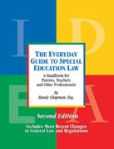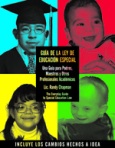Pages
Categories
- Categories
- Americans with Disabilities Act (59)
- children with disabilities (124)
- Disability Law (74)
- early intervention and part C (16)
- Individuals with Disabilities Education Act (112)
- least restrictive environment (17)
- Section 504 (61)
- Special Education Law (85)
- The Everyday Guide to Special Education Law (3)
- Vocational Rehabilitation (5)
- Categories
Archives
- January 2015
- December 2014
- November 2014
- September 2014
- June 2014
- May 2014
- April 2014
- March 2014
- November 2013
- October 2013
- August 2013
- July 2013
- May 2013
- April 2013
- February 2013
- January 2013
- October 2012
- September 2012
- August 2012
- July 2012
- June 2012
- May 2012
- March 2012
- February 2012
- January 2012
- December 2011
- November 2011
- September 2011
- August 2011
- July 2011
- June 2011
- May 2011
- April 2011
- March 2011
- February 2011
- January 2011
- December 2010
- October 2010
- August 2010
- June 2010
- May 2010
- April 2010
- March 2010
- February 2010
- January 2010
- December 2009
- November 2009
- October 2009
- September 2009
- August 2009
- July 2009
- June 2009
- May 2009
- April 2009
- March 2009
- February 2009
- January 2009
- December 2008
- November 2008
- October 2008
- September 2008
- August 2008
- July 2008
- June 2008
- May 2008
- April 2008
- March 2008
- February 2008
- January 2008
- December 2007
- November 2007
- October 2007
- September 2007
Calendar
April 2024 M T W T F S S 1 2 3 4 5 6 7 8 9 10 11 12 13 14 15 16 17 18 19 20 21 22 23 24 25 26 27 28 29 30
Americans with Disabilities Act
- "The Everyday Guide to Special Education Law"2nd Edition
- ADA Accessibility Guidelines
- ADA Statute
- ADA Title II Technical Assistance Manual
- ADA Title III Highlights
- ADA Title III Highlights in Spanish/ Puntos destacados del Título III
- ADA Title III Technical Assistance Manual
- AIDs.gov
- The Legal Center for People with Disabilities and Older People
- Title II ADA Regulations
Blogroll
Everyday Guide to Special Education Law
Individuals with Disabilities Education Act
- "The Everyday Guide to Special Education Law"2nd Edition
- @AbilityLaw on twitter
- Guia de La Ley de Educacion Especial
- IDEA Regulations
- Individuals with Disabilities Education Act Part B
- National Dissemination Center for Children with Disabilities
- Part C Individuals with Disabililties Education
- Preventing Litigation in Special Education WORKBOOK
- The Legal Center for People with Disabilities and Older People
- The National Early Childhood Technical Assistance Center
Part C and early intervention
- "The Everyday Guide to Special Education Law"2nd Edition
- @AbilityLaw on twitter
- Early Childhood Connections
- Guia de La Ley de Educacion Especial
- National Dissemination Center for Children with Disabilities
- Part C Individuals with Disabililties Education
- The Legal Center for People with Disabilities and Older People
- The National Early Childhood Technical Assistance Center
Section 504
Special Education Law
- "The Everyday Guide to Special Education Law"2nd Edition
- @AbilityLaw on twitter
- Guia de La Ley de Educacion Especial
- IDEA Regulations
- Individuals with Disabilities Education Act Part B
- National Dissemination Center for Children with Disabilities
- Part C Individuals with Disabililties Education
- Preventing Litigation in Special Education WORKBOOK
- The Legal Center for People with Disabilities and Older People
Special Education Law Information in Spanish
The Legal Center
Blog at WordPress.com. WP Designer.








Randy,
This is great information for families and professionals! Would it be possible to include the Early Childhood Connections website as a link under the Early Intervention heading?
Ardith,
Thanks for the feedback. As you can see I added Early Childhood Connections to the Early Intervention heading in the blogroll. I hope to add new posts weekly and welcome comments and questions
Gary,
Great blog! Very informative. I find I encounter more issues at daycare than I do at school though. I continually address the director with my concerns. Thank you for the information. I’ll check back weekly for new blogs.
Lisa,
I’m glad you like the blog and I’ll try to keep on top of posting new information. Let me know if there are day care issues that I can address.
Randy,
Thank you for this information, it is a great resource for both professionals as well as parents. I find that parents are often very concerned with Disability Harassment but do not know that there is an actual law that prohibits discrimination based on abusive and intimidating behavior towards students with disabilities.
Justin,
You’re welcome. You’re right that, unfortunatley, many parents and educators are unaware that disability harassment is a violation of 504 and the ADA. Thanks for taking the time to provide this feedback.
Randy I loved your article on dissability harrassment. I think I would add one comment, it is also up to the parents of children who are saying harmful things to other to help them understand and stop their behavior, if they know it is occurring and not just up to the school. My grandson started kindergarten this year and is in an inclusive educaitonal setting, when he sat next to a child that had a cognitive impairment he said to him, I think you should be in pre-school instead of kindergarten. When he told his mother and myself this we were shocked, we raised him to be kind and sensitive. Well he got a clear message that this was not acceptable. We also realized we had been telling him for months, you are so big and smart you get to go to kindergarten, so our words may of had an infuluence. Keep up the good work.
Thanks Katherine. I certainly agree that parents should model and coach appropriate behavior for their children.
RE: multi-tiered intervention model/Response to Intervention (RTI) process
I am writing from a treatment team of a Denver area community mental health center that is tasked with serving the needs of children with chronic mental health issues as well as working with families that have been court ordered to seek treatment for various reasons.
At a staff meeting we were recently made aware of a new process in place at Cherry Creek Schools that we were told will delay the process of getting children identified and getting them IEP’d. We were told that this is a new initiative that will soon be in place state (and nation) wide as part of the “No Children Left Behind” legislation.
I am writing to you because I have used your ‘Handbook for Special Education Rights’ as a guide for helping parents navigate Special Ed systems for a number of years, and this new initiative sounds like it represents a major departure from the established IEP/appeal/due process continuum.
Are you aware of any information available on this new initiative? Are you aware of any parent advocacy materials that community clinicians might be able to use to help parents navigate this new process? Is there any training available for Human Service professionals who work with the Educational System?
Thank you for your time and for any information you may be able to provide.
Chris,
Thanks for your comment regarding implementing the response to intervention process (RTI) in Colorado. You can find general information about RTI in my most recent book, The Everyday Guide to Special Education Law, on pages 23 to 25. You can also find information about RTI in Colorado at the Colorado Department of Education’s website at http://www.cde.state.co.us/cdesped/RTI.asp.
Since RTI is a tier based model providing for interventions over time to support students in general education, there has been concern by parents and advocates that implementing RTI may delay determining a student’s eligibility for special education. The IDEA 2004 Regulations (see the the link in my blogroll to the right under Special Education Law), however, make clear at 34 CFR 300.301 and 300.309(c) that special education eligibility must be determined witihin 60 days of the receipt of parental consent unless the parents and district agree otherwise.
I’m trying to get information on the rights of parents with disabled children in regards to employers. I have a 9 year old Autistic child and have him on a great routine with his school, the routine is imperitive and we have accomplished alot. My employer has now decided to tranfer me to another shift that will ( I and his educators) possibly cause a loss of what he has learned and definately cause some emotional issues. I have been his primary care person. I submitted a memo to my staff and the schools IEP director included their concerns in a written document, however, my employer denied the request stating it would set a bad prescedence. One of my supervisors said that although my son met ADA, I did not. I have been with the same agency for 13 years and am just at a loss. A few people have advised me to contactthe ACLU and ADA and see if it meets any criteria. ANY info from anyone appreciated.
Jane,
Thanks for your comment and question. The Americans with Disabilities Act has an “association provision” that prohibits discrimination against individuals because they have a relationship or associate with an individual with a disability, even though the individual does not have a disability. Unfortunately. the non discrimination provisions of the ADA related to persons who have a relationship to an individual with a disability does not include an obligation by the employer to provide reasonable accommodations. Thus, your employer may not be legally required to provide you an accommodation. You can find out more information regarding associational discrimination by looking at the EEOC website providing Q&A at http://www.eeoc.gov/facts/association_ada.html. This is just a general response to your question and doesn’t mean you do not have any claim under the ADA. You might want to consult with an attorney who knows disability law. Good luck.
Hi Randy,
I’m with the Disabilities Rights Center in New Hampshire. You have a very nice blog, I’ll be following it. We are considering starting a blog on disability rights in NH and are still weighing the pros and cons.
Julia,
Thanks for the kind words. Let me know if I can help in any way if your center decides to start blogging.
where can I find information about Educational Surrogate Parent training?
Susan,
Thnaks for your comment. For Part B services you should contact your State Education Agency and/or your local school district. For Part C early childhood services you should contact the lead agency in your state for Part C services.
Any thoughts on Fitzgerald v Barnstable School Committee, published 21 January 2009?
Peter thanks for raising Fitzerald v. Barnstable School Committee. In that case a girl’s parents had filed a lawsuit under Sec 1983 for the school district violating Title IX’s prohibition agaisst gender discrimination. The gender discrimination was based on sexual harassment of their daughter by a male student. The parents had repeatedly complained to school officials but the harassment continued. The lower courts ruled that Title IX was the “sole means of vindicating the constitutional right to be free from gender discrimination perpetrated by educational institutions.”
The Supreme Court reversed and said that since Title IX does not have a specific enforcement mechanism other than withholding federal funds, Sec. 1983 can be used to enforce Title IX. Section 504 is similar to Title IX, in that it does not have a comprehensive enforcment mechanism and the statutory remedy is withholding federal funds from the school district. Thus, Barnstable may mean 1983 can be used to enforce disability harassment claims and other disability discrimination claims under 504.
Hi Randy: I’m a disability services coordinator and am trying to find an electronic copy of your book “The Everyday Guide to Special Education Law, Second Edition” for a graduate student. I am not having any luck and wondered if you might be able to help. Class starts next week so I’m trying to find a solution quickly. Thanks very much.
Hi Karen,
I will make send you an electronic version of my book in a separate e mail. Thank you for contacing me on behalf of this student.
Perfect, thanks so much. We are in the process of transitioning Vision Home and Community Program into a Charter-Vision Charter Acadamy by July1. YIKES. Distict is on board which is great. Hope to see you very soon. Sara
I’m glad I was able to help.
My child’s school refuses to consider IDEA eligibility under OHI, stating that FSIQ and GAI scores negate deficient scores for processing, memory, written/verbal expression, math computation, social/emotional development, motor ability, skill aqcuisition, school attendance, medical diagnoses, prior educational diagnoses/IEP’s, symptom triggers/difficulties and functioning. Each attempt at genuinely addressing their numerous errors, unsupported concepts, continuous non-compliance and fraudulent records-keeping are met with stalling tactics and harsh retaliation. Mediation and Due Process is refused at every turn. What can be done when a district operates as though it is above the law? Our finances, wits and faith are tapped.
I’m sorry you’re having to deal with this, I know it is frustrating and stressful. You might try requesting an independent evaluation (IEE) please see my postings on that process. An IEE might add support for your son’s eligibility. If the school district is not responding or clearly violating the IDEA, you could file a complaint with the state department of education. You do not need an attorney to do that. You might also consider requesting an evaluation for eligibility under Section 504. There are numerous articles on that process on my blog. Good luck
Randy,
I’m trying to find information about a school district’s responsibility for making their outdoor athletic facilities accessible to spectators. This is a school built in the 80s.
Do you have any information that would help me convince them to get something done?
Hi Stacy,
The regulations implementing sec 504 went into effect in June 1977, before your school was built. Among other things, 504 requires that new construction or significant alterations to existing buildings must meet accessibility standards. Thus, it appears these athletic facilities should have been accessible. Additionally, in 1990 the ADA went into effect and it also has accessibility guidelines. The Office for Civil Rights has been focusing on athletic events. You’ll find numerous articles discussing 504 on my blog. I suggest you bring this to the attention of the 504 Coordinator for the district and perhaps contact the entity that regulates high school athletics in your state. If not successful you should contact OCR. Good luck